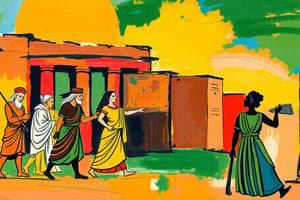Podcast
Questions and Answers
What is defined as the study of past events, particularly in human affairs?
What is defined as the study of past events, particularly in human affairs?
- Archaeology
- History (correct)
- Anthropology
- Sociology
Which historical period is characterized by the emergence of writing around 3000 BCE?
Which historical period is characterized by the emergence of writing around 3000 BCE?
- Middle Ages
- Ancient History (correct)
- Classical Antiquity
- Prehistory
What major event marked the transition to the Middle Ages?
What major event marked the transition to the Middle Ages?
- The Renaissance
- The Industrial Revolution
- The American Revolution
- The Fall of the Roman Empire (correct)
Which of the following figures was known for leading non-violent resistance for Indian independence?
Which of the following figures was known for leading non-violent resistance for Indian independence?
What term describes firsthand accounts such as letters and diaries in historical study?
What term describes firsthand accounts such as letters and diaries in historical study?
Which historical perspective focuses specifically on governance and political ideologies?
Which historical perspective focuses specifically on governance and political ideologies?
During which period did the Renaissance occur?
During which period did the Renaissance occur?
Which global conflict significantly reshaped international relations between 1939 and 1945?
Which global conflict significantly reshaped international relations between 1939 and 1945?
Flashcards are hidden until you start studying
Study Notes
Key Concepts in History
-
Definition of History: The study of past events, particularly in human affairs.
-
Importance of History:
- Understanding cultural heritage.
- Learning from past mistakes and successes.
- Contextualizing current events.
Major Historical Periods
-
Prehistory:
- Time before written records.
- Includes the Stone Age, Bronze Age, and Iron Age.
-
Ancient History:
- Emergence of writing (~3000 BCE).
- Civilizations: Mesopotamia, Ancient Egypt, Indus Valley, Ancient China, Mesoamerica.
-
Classical Antiquity:
- Rise of empires (e.g., Roman Empire, Persian Empire).
- Development of philosophy, art, and science.
-
Middle Ages:
- Fall of the Roman Empire (~476 CE) to the Renaissance (~1400 CE).
- Feudalism, the spread of Christianity, and the Islamic Caliphates.
-
Renaissance:
- Rebirth of art and learning (14th-17th centuries).
- Humanism and advances in science.
-
Modern History:
- Industrial Revolution (~1760-1840).
- World Wars I & II, the Cold War, and globalization.
Historical Methods
- Chronology: Organizing events in time.
- Primary Sources: Firsthand accounts (e.g., letters, diaries, artifacts).
- Secondary Sources: Interpretations of primary sources (e.g., books, articles).
Important Historical Figures
- Alexander the Great: Conqueror, spread of Hellenistic culture.
- Julius Caesar: Key figure in the demise of the Roman Republic.
- Genghis Khan: Founder of the Mongol Empire.
- Mahatma Gandhi: Leader in non-violent resistance for Indian independence.
Major Historical Events
- The Fall of Rome (476 CE): Transition to the Middle Ages.
- The Signing of the Magna Carta (1215): Foundation for modern democracy.
- American Revolution (1775-1783): Establishment of the United States.
- World War II (1939-1945): Global conflict reshaping international relations.
Historical Perspectives
- Cultural History: Examines daily life, traditions, and cultural expressions.
- Social History: Focuses on societal changes and movements.
- Political History: Studies governance, wars, and political ideologies.
- Economic History: Analyzes economic systems and their evolution.
Conclusion
Understanding history is crucial for comprehending human behavior, societal changes, and the development of civilizations. It provides insight into the present and guides future decision-making.
Key Concepts in History
- History encompasses the examination of past events in human affairs, providing insights into cultural heritage.
- It enables learning from historical mistakes and achievements, as well as contextualizing contemporary issues.
Major Historical Periods
- Prehistory: Encompasses the time before written records, including the Stone, Bronze, and Iron Ages.
- Ancient History: Marks the emergence of writing around 3000 BCE; notable civilizations include Mesopotamia, Ancient Egypt, Indus Valley, Ancient China, and Mesoamerica.
- Classical Antiquity: Characterized by the rise of empires like Rome and Persia, alongside significant progress in philosophy, art, and science.
- Middle Ages: Spans from the fall of the Roman Empire (~476 CE) to the Renaissance (~1400 CE), marked by feudalism, the spread of Christianity, and Islamic Caliphates.
- Renaissance: A cultural revival from the 14th to 17th centuries, emphasizing humanism and scientific advancements.
- Modern History: Focused on transformative events such as the Industrial Revolution (~1760-1840), two World Wars, the Cold War, and the onset of globalization.
Historical Methods
- Chronology: The systematic arrangement of events in sequential order.
- Primary Sources: Firsthand accounts such as letters, diaries, and artifacts, providing direct insight into historical events.
- Secondary Sources: Interpretative works like books and articles, analyzing and contextualizing primary sources.
Important Historical Figures
- Alexander the Great: Acclaimed conqueror known for the expansion of Hellenistic culture across his empire.
- Julius Caesar: Influential in the downfall of the Roman Republic, known for his pivotal role in Roman history.
- Genghis Khan: Renowned as the founder of the Mongol Empire, which became the largest contiguous empire in history.
- Mahatma Gandhi: Prominent leader advocating for non-violent resistance, pivotal in India's struggle for independence.
Major Historical Events
- The Fall of Rome (476 CE): A critical transition marking the onset of the Middle Ages.
- The Signing of the Magna Carta (1215): Established foundational principles for modern democracy, limiting the powers of authority.
- American Revolution (1775-1783): Resulted in the formation of the United States, representing a significant shift in governance.
- World War II (1939-1945): A global conflict that reshaped international relations and influenced the geopolitical landscape.
Historical Perspectives
- Cultural History: Investigates daily life, traditions, and expressions of culture throughout history.
- Social History: Examines societal changes, movements, and the evolution of social structures.
- Political History: Focuses on governance, wars, political ideologies, and their impact on societies.
- Economic History: Analyzes the development and transformation of economic systems over time.
Conclusion
Grasping the essence of history is vital for understanding human behavior, societal evolution, and the progression of civilizations, offering insights that inform present actions and guide future decisions.
Studying That Suits You
Use AI to generate personalized quizzes and flashcards to suit your learning preferences.




